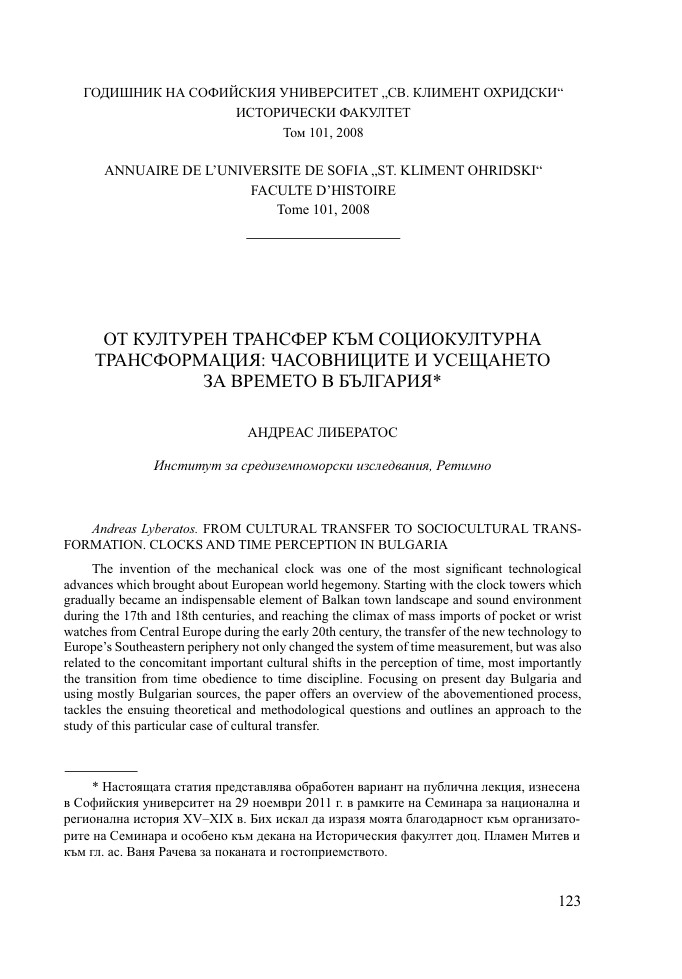From Cultural Transfer to Sociocultural Transformation
Clocks and the Sense of Time in Bulgaria
DOI:
https://doi.org/10.60053/GSU.IF.1.101.123-143Keywords:
clock, time measurement, BulgariaAbstract
The invention of the mechanical clock was one of the most signifi cant technological advances which brought about European world hegemony. Starting with the clock towers which gradually became an indispensable element of Balkan town landscape and sound environment during the 17th and 18th centuries, and reaching the climax of mass imports of pocket or wrist watches from Central Europe during the early 20th century, the transfer of the new technology to Europe’s Southeastern periphery not only changed the system of time measurement, but was also related to the concomitant important cultural shifts in the perception of time, most importantly the transition from time obedience to time discipline. Focusing on present day Bulgaria and using mostly Bulgarian sources, the paper offers an overview of the abovementioned process, tackles the ensuing theoretical and methodological questions and outlines an approach to the study of this particular case of cultural transfer.
References
Добринов, М. За изнамерването на сахатите за в джоб. – Читалище, II, № 6–7, 272–327, 312–315.
Dobrinov, M. Za iznamervaneto na sahatite za v dzhob. – Chitalishte, II, № 6–7, 272–327, 312–315.
Mumford, L. Technics and Civilization. London, 1934; Cipolla, C. Clocks and Culture 1300–1700. London, 1967; Landes, D. S. Revolution in Time. Clocks and the Making of the Modern World. Harvard, 1983.
Macey, S. L. Clocks and the Cosmos. Time in Western Life and Thought. Hamden, 1980.
Вж. напр.: Le Goff, J. Au Moyen Age: Temps de l’Eglise et temps du marchand. – Annales ESC, XV, 1960, No 3, 417–433; Idem. Le temps du travail dans la ‘crise’ du XVIe siècle: du temps médiéval au temps moderne. – Le Moyen Age, 69, 1963, 597–613; De Grazia, S. Of Time, Work and Leisure. New York, 1962; Thompson, E. P. Time, Work-discipline and Industrial Capitalism. – Past & Present, 38, Dec. 1967, 56–97; Zerubavel, E. The Standardization of Time: a Socio-historical Perspective. – The American Journal of Sociology, 88, 1982, No 1, 1–23; Mohavedi, S. Cultural Preconceptions of Time. Can We Use Operational Time to Meddle on God’s Time? – Comparative Studies in Society and History, 27, 1985, No 3, 385–400. За един изключително информативен преглед вж.: Landes, D. Цит. съч.
Вж. между други: Espagne, M., Μ. Werner. La construction d’une référence culturelle allemande en France. Genèse et histoire (1750–1914). – Annales ESC, 42, 1987, No 4, 969–992; Eidem (eds). Transferts. Relations interculturelles dans l’espace francoallemand (XVIIIe–XIXe
siècle). Paris, 1988; Lüsebrink, H.-J., R. Reichardt (eds). Kulturtransfer im Epochenumbruch. Frankreich – Deutschland 1770 bis 1815. Leipzig, 1997; Middell, M. Kulturtransfer und historische Komparatistik – Thesen zu ihrem Verhältnis. – Comparativ 10, 2000, No 1, S. 7–41.
Werner, M., B. Zimmermann. Beyond comparison: histoire croisée and the challenge of reflexivity. – History and Theory, 45, 2006, 30–50.
De Busbecq, O. The Turkish Letters of Ogier Ghiselin de Busbecq, transl. by E. S. Forster. Oxford, 1927, 135–136; Йонов, М. (ред.) Немски и австрийски пътеписи за Балканите XVII –средата на XVIII в. С., 1986, с. 82 и др. Вж. също Gradeva, R. On ‘Frenk’ Objects in Everyday Life in Ottoman Balkans: the case of Sofi a, mid-17th – mid 18th c. – In: Relazioni Economichetra Europa e Mondo Islamico secc. XIII–XVIII. Prato, 2006, 785–788
Цветкова, Б. (ред.) Френски пътеписи за балканите. Т. 1. XV–XVIII век. С., 1979, 237–238. Евлия Челеби, пътувайки по същото време из Балканите, описва в пътешествието си трийсет часовникови кули в различни балкански градове. Lowry, H. W., Y. Dağlı. The Passing of Time: Ottoman Clock Towers in the Balkans, ca. 1570–1675. – In: Balta, E.,Y. Dedes, E. N. İşli, M. S. Koz (eds). Yücel Dağlı Anasına: „Geldi Yücel, Gitti Yücel. Bir Nefes Gibi“. İstanbul, 2011, с. 426.
Вж. напр. Йонов, М. Европа отново открива българите. ХV–ХVІІІ век. С., 1980, 150–151. За усвояването на западна техника от страна на османците вж. İshanoğlu, E. Some Remarks on Ottoman Science and its Relation with European Science and Technology up to the End of 18th Century. – In: Idem. Science, Technology and Learning in the Ottoman Empire.
Ashgate, 2004, I, 45–71.
Deringil, S. “They Live in a State of Nomadism and Savagery”: The Late Ottoman Empire and the Post-Colonial Debate. – Comparative Studies in Society and History, 45, No 2, 2003, р. 320; Uluengin, M. Secularizing Anatolia Tick by Tick: Clock Towers in the Ottoman Empire and the Turkish Republic. – International Journal of Middle Eastern Studies 42, 2010, 17–36; Wishnitzer, A. A comment on Mehmet Bengü Uluengin, “Secularizing Anatolia Tick by Tick: Clock towers in the Ottoman Empire and the Turkish Republic”. – International Journal of Middle Eastern Studies, 42, 2010, 537–540.
Yonov, M. Evropa otnovo otkriva balgarite. HV–HVІІІ vek. S., 1980, 150–151.
Tsvetkova, B. (red.) Frenski patepisi za balkanite. T. 1. XV–XVIII vek. S., 1979, 237–238.
Yonov, M. (red.) Nemski i avstriyski patepisi za Balkanite XVII – sredata na XVIII v. S., 1986, s. 82 i dr.

Downloads
Published
How to Cite
Issue
Section
Categories
License

This work is licensed under a Creative Commons Attribution 4.0 International License.
Annual of Sofia University "St. Kliment Ohridski" - Faculty of History (GSU-IF).







